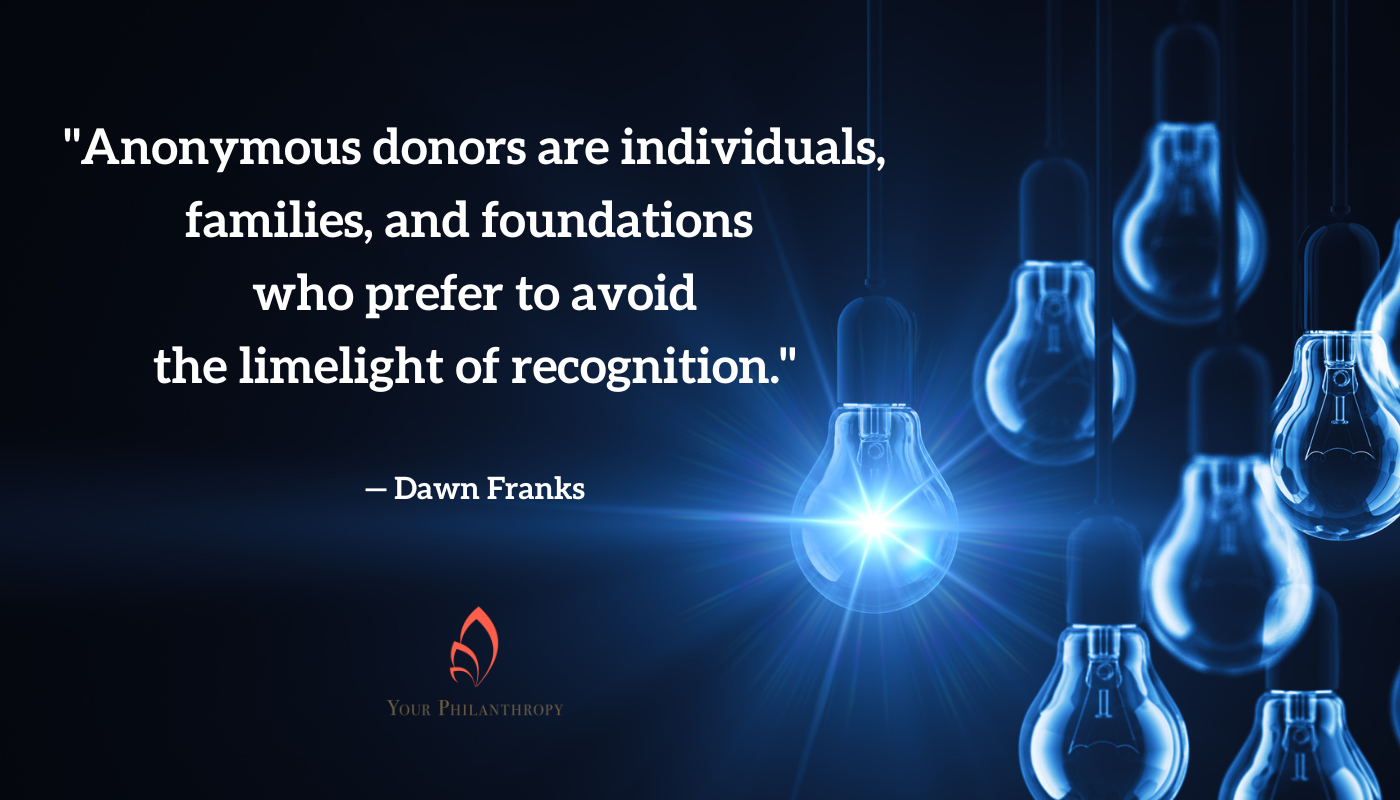How “anonymous” is an anonymous gift? An even better question: how anonymous is a gift to a nonprofit organization in today’s digital world?
The answers are not simple. Let’s start with what anonymous means to you.
- Is it not being noticed for specific actions or gifts you made?
- Is it okay to be known by a few but not the many?
- Is it making a gift or doing something unremarkable?
- Do you want to be unrecognized?
The twelfth-century Jewish scholar Maimonides wrote about anonymous giving in the Laws About Giving to Poor People, describing his famous Eight Levels of Giving. The bottom level is the least charitable, while the top is the greatest form of tzedakah (a Hebrew word for philanthropy and charity).
Two levels, close to the top of his list, are about anonymous giving.
- Third from the top: We know the recipients, but they don’t know us.
- Almost to the top: Neither the recipient nor we know each other.
But Maimonides could not have envisioned the internet or donor records stored in mega servers we call clouds. Instead, he described charity at the most personal level, where records often live in our hearts.
Before we go further, let me share a story with you.
During my time as President of the United Way, my work was to raise money to fund twenty-four agencies. One day a gentleman called and wanted to meet me. That wasn’t surprising since my job required connecting with people to raise as much money as possible. The gentleman explained he was with an organization that focused on giving to non-profits with programs doing important work in the community and strong executive and board leadership.
Topping it off, they did their work anonymously.
We did have a program that caught their attention and received a grant. But here’s the kicker to the story.
At a meeting of United Way agency executives, I shared our news about the “anonymous funder.” Smiles broke out around the room, and heads nodded. They had received grants from the same “anonymous funder.”
So, I ask you, was it an anonymous grant?
There were no requirements to keep the grant anonymous, but it was their preference. And when they came to see us, there was always the reminder that they preferred not to be recognized.
Anonymous donors are individuals, families, and foundations who prefer to avoid the limelight of recognition. Their reasons vary from discomfort with recognition generally to a preference to fund under the radar and reduce unsolicited asks from nonprofit organizations they haven’t historically funded.
They prefer to pick their targets rather than be the target.
Sound fundraising practice for nonprofit organizations looks a lot like targeting. For some donors, identifying nonprofit targets is equally important work. An anonymous gift is a tool in their tool belt.
Here are four reasons to make your gift anonymous:
- It allows you to identify organizations you want to focus on and make intentional decisions about your giving.
- It allows you to give larger gifts to a specific organization and avoids the assumption that you always give at that level.
- Most of the time, you avoid being listed publicly as a donor.
- It allows you to give and not explain.
There are also valid reasons for not giving anonymously:
- You set an example by your giving, and others follow.
- The more names an organization can list as donors publicly, the more likely they will grow their programs and services.
- You receive friendly recognition from their board members and fellow donors who perceive you as caring about their cause.
- You encourage the board, staff and volunteers that the work they are committed to matters. I know the anonymous donor intends the same, but it may not feel the same to them.
Occasionally, a donor makes a gift to an organization and is identified as a major contributor on that organization’s 990, the IRS-required tax form. Specific rules and formulas dictate such instances. If you are making a rather large gift to an organization and are interested in remaining anonymous, it is worth checking out with your CPA and theirs.
The biblical view of anonymous giving:
For Christians, the words of Jesus found in Matthew 6:1 (ESV) encourages believers to give anonymously.
“Be sure that you not do your charitable deeds before men to be seen by them. Otherwise, you have no reward from your Father who is in heaven.”
Near anonymous giving:
One fool-proof way to be an anonymous donor and make gifts anonymously is to do your giving through a donor-advised fund. Various platforms, such as the East Texas Communities Foundation or an investment advisory service, provide a way to make your gift anonymously. Unfortunately, your gift is not completely anonymous because they keep records, but it is not made public to the recipient organization or the public.
Decide the level of recognition that’s right for you. Either way, your gift matters to the organization.
If you prefer to be the “anonymous funder,” now is as good a time as any other to get busy. Call me if you want to talk before you make your anonymous gift.
Like it? Use it. Share it. Comment below.



One Response
You provided an excellent explanation of anonymity in giving.